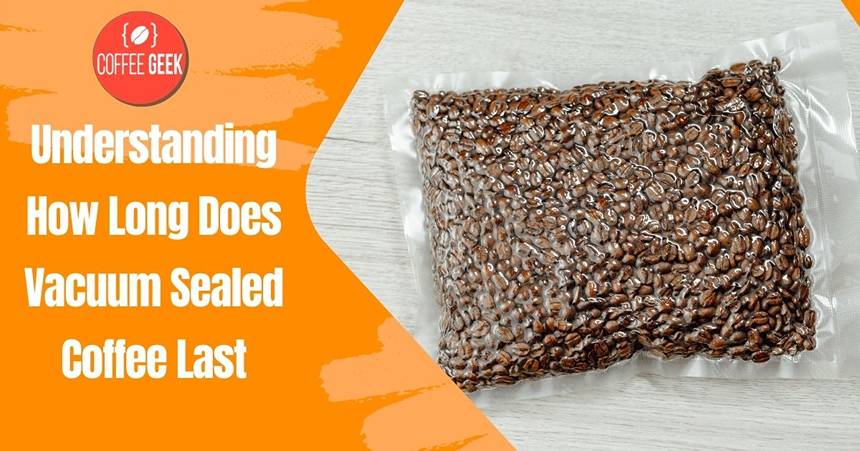As a coffee aficionado, isn’t it fascinating to find out how long does vacuum sealed coffee last?
There’s a unique pleasure that brews up with each cup of coffee enjoyed, savored with the enchanting aroma and delightful taste of freshly ground coffee.
Oh, the joy! So let’s dive into understanding more about the shelf life of vacuum-sealed coffee, shall we?
How Long Does Vacuum Sealed Coffee Last?
Estimating the shelf life of vacuum-sealed coffee beans can be tricky. Once vacuum-sealed, coffee beans can last approximately one to two years.
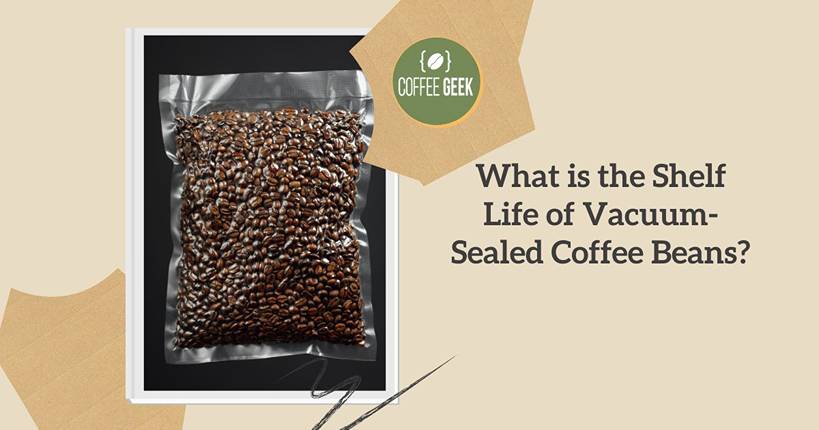
However, the freshness of these vacuum-sealed coffee beans depends on a few key factors.
Identifying the Freshness of Vacuum-Sealed Coffee Beans
Physical examination of the sealed bag can provide clues about the freshness. Coffee beans, when fresh, often release carbon dioxide, which inflates the vacuum-sealed bag, akin to an airtight container.
If the bag is flat, it’s been opened or the beans might have lost their freshness.
Does the Roast of Coffee Beans Affect Their Shelf Life?
Selecting the roast affects how long your coffee lasts.
Darker roast, contrary to popular belief, has a shorter shelf life as it undergoes intense heat treatment; hence, it tends to oxidize and go stale faster.
Will a Vacuum-Sealed Bag Make Coffee Beans Last Longer?
Vacuum-sealing can indeed make coffee beans last longer.
With vacuum sealing, the beans and whole beans are enveloped in a low oxygen environment, reducing oxidation, preserving the flavors, and thus prolonging the shelf life of coffee.
How Does Storage Affect the Longevity of Vacuum-Sealed Coffee?
Proper Store Methods for Vacuum-Sealed Coffee
To store your coffee in such a way to best preserve its freshness, always ensure it’s shielded from light, moisture, heat, and air.
Store coffee beans in a cool, dry, dark place, preferably in a sealed bag or an airtight container.
Do Coffee Beans Last Longer Than Ground Coffee in Vacuum-Sealed Bags?
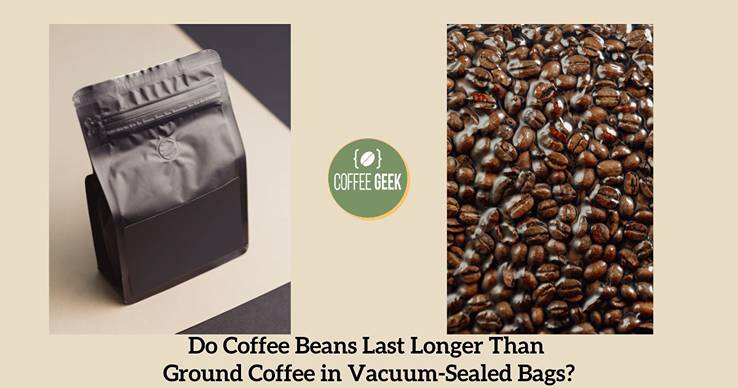
Indeed, coffee beans last longer than ground coffee. Vacuum-sealing whole coffee beans conserves more flavor as they have less surface area exposed to air.
Ground coffee oxidizes faster and thus, its freshness fades quicker.
Does an Unopened Vacuum-Sealed Coffee Bag Stay Fresh for Longer?
Certainly, an unopened, vacuum-sealed bag of coffee will stay fresh for longer as compared to an opened one.
Vacuum-sealing helps to preserve the coffee fresh by maintaining its innate flavors and fragrances for as long as possible.
Frequently Asked Questions about Vacuum-Sealed Coffee and Its Shelf Life
How Long Do Vacuum-Sealed Roasted Coffee Beans Last?
Dependent on the storage conditions, vacuum-sealed roasted coffee beans can last up to two years from the roast date, with freshness being best in the first month.
Can Vacuum-Sealed Ground Coffee Go Bad?
While vacuum-sealed ground coffee doesn’t exactly go bad, it does lose its freshness and aroma over time, affecting the taste and texture of your cup of coffee.
Does Vacuum-Sealed Brewed Coffee Remain Fresh For Longer?
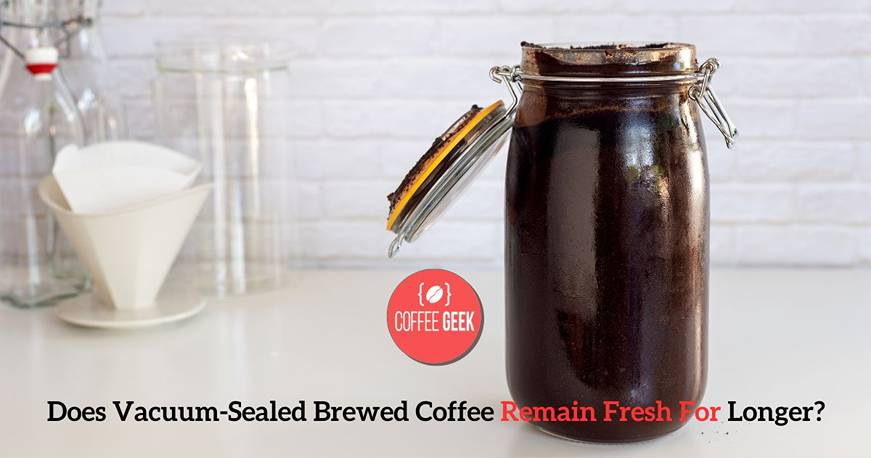
Brewed coffee, even if vacuum-sealed, is best consumed immediately.
Despite vacuum sealing, it won’t remain fresh for an extended duration, typically going stale after a couple of hours.
Tips to Keep Your Vacuum-Sealed Coffee Fresh
How to Grind Your Vacuum-Sealed Coffee for the Best Freshness
To keep the flavor intact, grind your vacuum-sealed coffee just before brewing.
This ensures maximum freshness as coffee grounds lose flavor faster due to higher surface exposure.
Best Practices to Store Your Coffee Beans
After opening a vacuum-sealed coffee bag, store the remaining coffee beans in a dark and cool place.
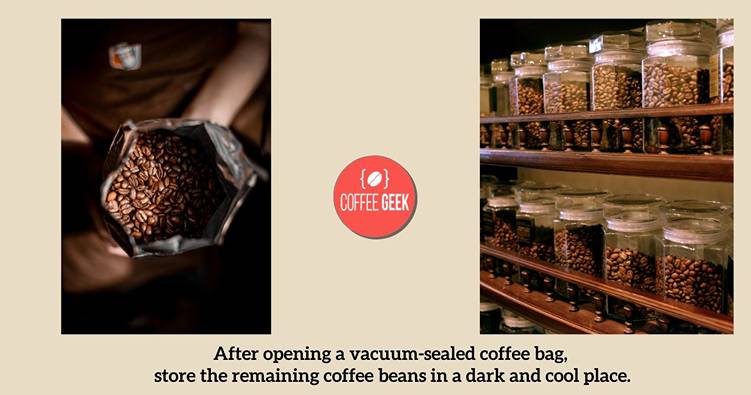
Using an opaque, airtight container will help to maintain the coffee aroma and features longer.
How to Keep Your Vacuum-Sealed Coffee as Fresh as Possible
Avoid the temptation to bulk buy. Purchase in smaller quantities more frequently to enjoy the freshest coffee.
Once a vacuum-sealed bag is opened, consume it as quickly as possible to keep your coffee fresh.
Decoding the Expire Date on Vacuum-Sealed Coffee
Does Vacuum-Sealed Coffee Really Expire?
While vacuum-sealed coffee doesn’t become unsafe to consume with time, its inherent flavors, aroma and freshness diminish, considerably affecting its overall taste post the manufacturer’s recommended “best by” date.
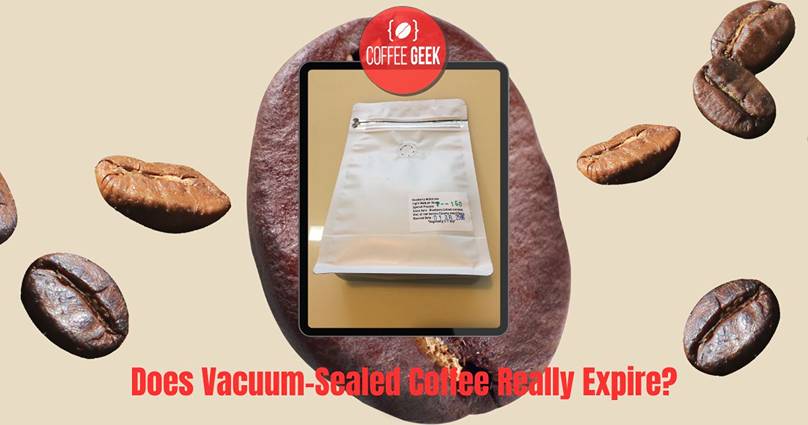
How to Interpret The Expiry Date on Vacuum-Sealed Bags of Coffee
The expiry date on vacuum-sealed coffee bags hints the estimated time frame during which the producer guarantees the coffee’s optimal freshness.
However, beyond this date, the vacuum-sealed coffee doesn’t go bad, but begins to lose its flavor and aroma progressively.
Can You Brew And Drink Coffee Past Its Expiry Date in Vacuum-Sealed Bags?
Yes, you can brew and drink coffee past its expiry date in vacuum-sealed bags, but it might not deliver the pleasant flavor and aroma that one expects from a cup of coffee.
| Storage Conditions | Shelf Life of Vacuum-Sealed Coffee |
|---|---|
| Unopened vacuum-sealed bag | 1-2 years |
| Opened vacuum-sealed bag | 2 weeks to 1 month (store in a cool, dark place) |
| Ground coffee vs. Whole beans | Ground coffee tends to degrade faster than whole beans |
| Freezing vacuum-sealed coffee | Can extend shelf life up to 2 years, but avoid frequent thawing and refreezing |
Conclusion
When it comes to preserving the freshness and taste of coffee, one common question is, “how long do coffee beans last?” especially when stored in vacuum-sealed packaging.
Vacuum sealing is a method used to keep the air and, consequently, the exposure to oxygen, to a minimum.
This process is crucial as oxygen can degrade the quality of coffee beans much quicker, impacting their natural oils and flavors.
Coffee beans in an airtight or vacuum-sealed environment tend to preserve their quality better compared to beans left in open or poorly sealed containers.
Typically, coffee beans within vacuum-sealed packaging can last up to five months. The key to prolonging their shelf life is to limit their exposure to air and other environmental factors like light and moisture.
It’s important to keep in mind that coffee beans degas, releasing carbon dioxide, especially soon after roasting.
In the context of vacuum-sealed coffee, this degassing process can slightly impact the beans’ longevity.
Manufacturers often use resealable or sealable packaging that allows some of this gas to escape while still minimizing the amount of air that gets in.
This type of packaging helps to keep the coffee beans freshness for very long.
When you choose the best storage method for your coffee, it’s essential to consider the original packaging of the beans.
Many roasters pack their beans in specially designed bags that are both resealable and have a one-way valve to let gases escape while keeping the air out.
If you’ve opened the original packaging, it’s important to keep the beans in a container that limits as much air exposure as possible.
In conclusion, the shelf life of vacuum-sealed coffee beans can extend to about five months, ensuring the beans’ freshness and taste are retained.
The key factors include minimizing exposure to oxygen, choosing the right storage methods, and understanding the natural degassing process of the beans.
Proper storage in vacuum-sealed, resealable, or sealable containers can significantly help in preserving the quality and flavor of your coffee beans.
Common Questions
How long do vacuum-sealed coffee beans last?
Typically, vacuum-packed coffee beans in an unopened pack can last for 2-3 years if stored correctly.
However, once opened, it’s recommended to consume within 3-5 months to maintain their potency and flavour.
How long does vacuum-packed coffee beans stay fresh?
Vacuum-packed beans in an unopened pack can remain fresh for two to three years. But once you break the seal, they will begin to lose their flavour after about 3-5 months due to the oxidation process.
Should I store the vacuum-sealed coffee in the fridge?
Storing coffee in the fridge isn’t recommended, because it can lead to condensation which degrades the quality.
It can also absorb odors from other foods in the fridge. Ideally, store your vacuum-packed beans in a cool, dark pantry or cupboard.
What is the shelf life of coffee stored in a vacuum seal?
Stored in a vacuum seal, an unpacked coffee can last for 2-3 years. Once opened and properly stored in an air-tight container it can still offer fresh coffee for as long as 3-5 months.
Do roasted coffee beans last longer when stored in a vacuum?
Yes, when compared to ground coffee, roasted beans have a much larger surface area and resist the oxidation process better, which helps to retain their flavour.
When stored in a vacuum-sealed environment, they could stay fresh for 2-3 years if left unopened and up to 6-9 months once opened.
How do I store coffee beans to keep them fresh as long as possible?
To keep it fresh for as long as possible, store the beans in an airtight container, ideally a vacuum-packed one.
Choose a cool, dark place like a pantry or a cupboard to minimize exposure to light and heat.
Do vacuum-sealed coffee beans always taste fresher?
Not always, but generally vacuum-sealed beans last longer and taste fresher for a longer period than beans stored in a non-sealed container.
However, quality and freshness can be impacted by many factors, including the quality of the beans, the roast, and whether the beans remain unopened.
What happens to the coffee beans if I leave the vacuum seal open?
If you leave the vacuum seal open, the beans will begin to oxidize and lose their flavour and freshness relatively quickly.
To get the best from your coffee beans, it’s important to store them in an airtight container after opening the vacuum seal.
Are vacuum-sealed coffee beans the best choice for serious coffee drinkers?
Absolutely. For serious coffee drinkers, vacuum-sealed beans offer the ability to keep their beans fresh for a longer period and savor the taste from the first sip to the last.
It’s a worthy investment if you value your coffee experience.
How do I know if my vacuum-sealed coffee beans have gone bad?
Coffee beans don’t necessarily “go bad” like spoiled food, but they can become stale. Signs of stale coffee beans include minimal aroma, a bitter taste, and a flat flavor profile.
If you’re storing beans in a vacuum seal, you can prevent them from becoming stale for a longer period.

